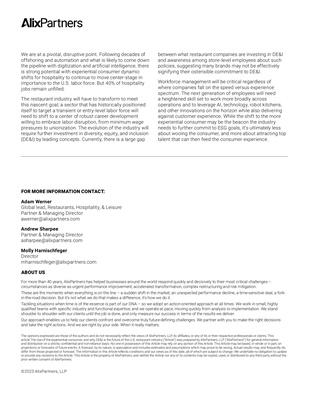
FOR MORE INFORMATION CONTACT:
Adam Werner
Global lead, Restaurants, Hospitality, & Leisure
Partner & Managing Director
awerner@alixpartners.com
Andrew Sharpee
Partner & Managing Director
asharpee@alixpartners.com
Molly Harnischfeger
Director
mharnischfeger@alixpartners.com
ABOUT US
For more than 40 years, AlixPartners has helped businesses around the world respond quickly and decisively to their most critical challenges -
circumstances as diverse as urgent performance improvement, accelerated transformation, complex restructuring and risk mitigation.
These are the moments when everything is on the line - a sudden shift in the market, an unexpected performance decline, a time-sensitive deal, a forkin-the-road
decision. But it's not what we do that makes a difference, it's how we do it.
Tackling situations when time is of the essence is part of our DNA - so we adopt an action-oriented approach at all times. We work in small, highly
qualified teams with specific industry and functional expertise, and we operate at pace, moving quickly from analysis to implementation. We stand
shoulder to shoulder with our clients until the job is done, and only measure our success in terms of the results we deliver.
Our approach enables us to help our clients confront and overcome truly future-defining challenges. We partner with you to make the right decisions
and take the right actions. And we are right by your side. When it really matters.
The opinions expressed are those of the authors and do not necessarily reflect the views of AlixPartners, LLP, its affiliates, or any of its or their respective professionals or clients. This
article The rise of the experiential consumer, and why DE&I is the future of the U.S. restaurant industry ("Article") was prepared by AlixPartners, LLP ("AlixPartners") for general information
and distribution on a strictly confidential and non-reliance basis. No one in possession of this Article may rely on any portion of this Article. This Article may be based, in whole or in part, on
projections or forecasts of future events. A forecast, by its nature, is speculative and includes estimates and assumptions which may prove to be wrong. Actual results may, and frequently do,
differ from those projected or forecast. The information in this Article reflects conditions and our views as of this date, all of which are subject to change. We undertake no obligation to update
or provide any revisions to the Article. This Article is the property of AlixPartners, and neither the Article nor any of its contents may be copied, used, or distributed to any third party without the
prior written consent of AlixPartners.
©2023 AlixPartners, LLP
We are at a pivotal, disruptive point. Following decades of
offshoring and automation and what is likely to come down
the pipeline with digitization and artificial intelligence, there
is strong potential with experiential consumer dynamic
shifts for hospitality to continue to move center-stage in
importance to the U.S. labor force. But 40% of hospitality
jobs remain unfilled.
The restaurant industry will have to transform to meet
this nascent goal; a sector that has historically positioned
itself to target a transient or entry-level labor force will
need to shift to a center of robust career development
willing to embrace labor disruption, from minimum wage
pressures to unionization. The evolution of the industry will
require further investment in diversity, equity, and inclusion
(DE&I) by leading concepts. Currently, there is a large gap
between what restaurant companies are investing in DE&I
and awareness among store-level employees about such
policies, suggesting many brands may not be effectively
signifying their ostensible commitment to DE&I.
Workforce management will be critical regardless of
where companies fall on the speed versus experience
spectrum. The next generation of employees will need
a heightened skill set to work more broadly across
operations and to leverage AI, technology, robot kitchens,
and other innovations on the horizon while also delivering
against customer experience. While the shift to the more
experiential consumer may be the beacon the industry
needs to further commit to ESG goals, it's ultimately less
about wooing the consumer, and more about attracting top
talent that can then feed the consumer experience.